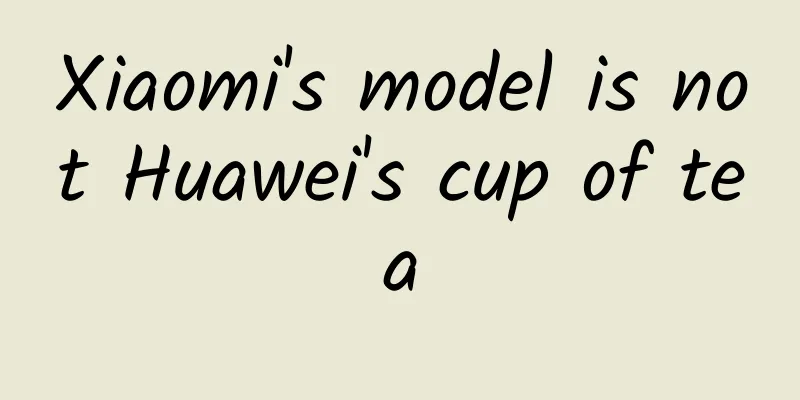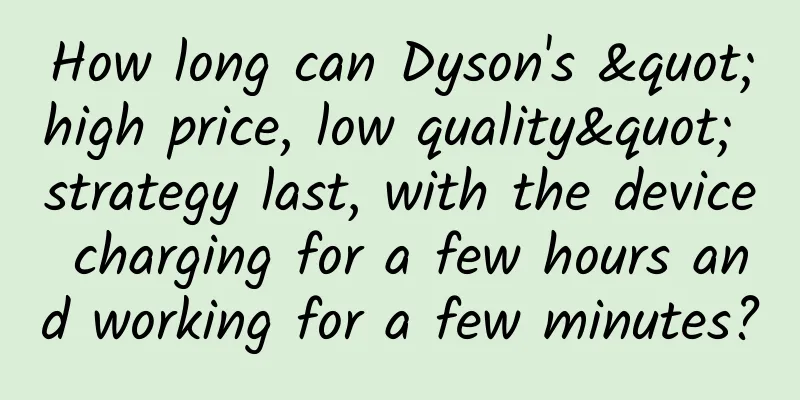Xiaomi's model is not Huawei's cup of tea

|
Recently, Huawei confirmed to the media that Zhu Ping, who returned from overseas, will replace Wang Weijun as the president of Huawei Terminal China, and said that Zhu Ping had already begun to familiarize himself with the business in China in March. Huawei Terminal, which mainly sells smartphones, has had frequent personnel changes recently. In addition to Zhu Ping being appointed as the new president of China, Huawei also appointed Xu Zhiqiang as the president of Huawei Terminal's US business. Prior to this, Huawei also appointed He Ming as the general manager of the US business. Although Huawei explained that these personnel changes were all normal reasons, Wang Weijun retired due to health reasons, and the personnel changes in the United States were normal rotations (it is customary for Huawei cadres to rotate every two to three years), there are still analysts who link it to the previous "instructions" of Ren Zhengfei. Previously, Ren Zhengfei, founder and president of Huawei, pointed out at a lunch meeting with the management team of Huawei's Consumer BG: "Huawei's Consumer BG should insist on taking its own path. I am who I am! Don't blindly benchmark against Apple, Samsung, and Xiaomi! I hope that the Consumer BG will not become a bubble after victory, and don't go astray. So e-commerce should not talk about sales, but how much profit it can make." It is still difficult to say how much the appointment of Zhu Ping, who is familiar with the higher-end overseas market, has to do with Ren Zhengfei's latest speech on "profit over sales", but as the helmsman of Huawei, Ren Zhengfei's every instruction has a huge impact on the development direction of Huawei's terminals. This is certain. Before 2011, Huawei's terminals were not even an independent large department. They mainly made white-label mobile phones (without Huawei's logo) for operators. Ren Zhengfei proposed in an internal speech that they should "take their own path", so Huawei's Consumer BG business and Huawei's independent mobile phone brand were established. In 2013, inspired by his competitors’ e-commerce business with Internet thinking, Ren Zhengfei had high expectations for e-commerce. At a Huawei terminal conference in Shanghai, he talked about the widely circulated “selling Argentine beef” and said, “You are too rigid”, setting the tone for Huawei’s e-commerce development. “As long as it is conducive to development, each can consider independent operation, the purpose is to make money. You value the process, but I value the result”. After that, the “Honor” brand became independent and a series of aggressive market moves were made. Ren Zhengfei’s new instruction of “making profits” will definitely affect the business direction of Huawei terminals again. The independence of the “Honor” brand was originally intended to balance the products of e-commerce and public channels and solve the conflict between Honor and other Huawei products. Honor has definitely succeeded in sales by competing with Internet mobile phone companies such as Xiaomi and Meizu in the e-commerce channel with an independent “Honor” brand, selling 4 million units in half a year. However, in terms of results, after a trial on the Internet, after the actual accounting, it has not met the requirement of “making money”. Ren Zhengfei is actually not satisfied with the low-profit "Xiaomi model". "Only 30 yuan is earned from a mobile phone", "hype online, sell at a higher price offline" (Huawei Terminal CEO Yu Chengdong said), this kind of play is not Huawei's cup of tea. The "Xiaomi model" of small profits and quick turnover is currently successful, but whether it can ultimately succeed is still controversial, because Xiaomi needs to continuously expand its product line and tell various product stories to continuously expand sales. Once sales stop growing, the "Xiaomi model" is prone to problems, which is probably what Ren Zhengfei calls "bubble". Ren Zhengfei's urgent call to stop may be because he feels that this model cannot be sustained, or it may be because it is more difficult for Huawei to do it. Unlike Xiaomi, Huawei's terminals also have operator channels with larger sales volumes. It is difficult for "Honor" to have no impact on channel sales with small profits and quick turnover. In addition, Huawei and Xiaomi have different costs and markets. In order to compete for the high-end mobile phone market globally, Huawei's investment in terminal research and development is very high, even exceeding the annual profit of the terminal. The expenses mainly come from subsidies for Huawei's traditional operator business. In this case, the "Xiaomi model" of low or even no profit was finally deemed unacceptable by Ren Zhengfei after some practice, and Huawei did not want to continue playing this game. Xiaomi is just painting a pie in the sky, and what it wants is the future, while Huawei is pursuing profits. Ren Zhengfei's "correction" of Honor certainly makes sense, but it will take time to prove who is right and who is wrong. The change from full enthusiasm to cooling down and pouring water on Huawei's terminal strategy shows that even Ren Zhengfei is still taking a rudimentary attitude towards how the company will respond to the impact of the Internet and initiate changes, and is no longer so confident. This is not uncommon among Chinese entrepreneurs, including Haier Zhang Ruimin's latest speech. Faced with the uncertain future driven by the new Internet thinking, they are anxious and hesitant, but they have to face it bravely. On June 16, Ren Zhengfei admitted in a groundbreaking collective interview with the media in Shenzhen that "many employees do not listen to us, including senior cadres." So, in the face of the new wave, will the rich experience and vision of the old entrepreneurs continue to work this time? Is Lian Po too old, or is it that an old man in the family is like a treasure? As a winner of Toutiao's Qingyun Plan and Baijiahao's Bai+ Plan, the 2019 Baidu Digital Author of the Year, the Baijiahao's Most Popular Author in the Technology Field, the 2019 Sogou Technology and Culture Author, and the 2021 Baijiahao Quarterly Influential Creator, he has won many awards, including the 2013 Sohu Best Industry Media Person, the 2015 China New Media Entrepreneurship Competition Beijing Third Place, the 2015 Guangmang Experience Award, the 2015 China New Media Entrepreneurship Competition Finals Third Place, and the 2018 Baidu Dynamic Annual Powerful Celebrity. |
>>: Windows 11 now supports Android. Can the Surface tablet change the iPad's monopoly?
Recommend
Event Promotion Plan | Key points on event design and traffic considerations!
To make a successful event, you often need three ...
How to find accurate seed users? Attached with classic practical cases!
Analysis ideas for finding seed users : The follo...
Popular Science Comic | What is the origin of the "Mongolian Cyclone" that mass-produces strong spring winds?
my country is affected by strong winds all year r...
Can eating more vegetables make you fatter? Many people don’t know this and still eat them every day…
Vegetables are an essential food for maintaining ...
A guide to operations, upgrades and monster fighting for children aged 0-10!
According to the career development stages of ope...
Teach you how to clean up your phone's memory garbage correctly, clean up dozens of GB in an instant, save and clean up
When we use our mobile phones for a long time, th...
Li Xiang, founder of Autohome: FF91 is great but delivery is a big problem
Recently, Faraday Future, invested by LeEco, offi...
Father’s Day Marketing Promotion: How Can Brands Break Through and Win?
Introduction: As an important festival IP, it is ...
The most undesirable bug in Android: fix is nowhere in sight
Android 5.1 has been pushed to many Nexus devices...
Over 100 days! Wang Yaping sets a new record again!
Launched on October 16, 2021 Shenzhou 13 It will ...
Everyone is talking about user growth, have you avoided these 3 pitfalls?
In my book "Exploding User Growth ", I ...
Google AI: No one knows how it works
【51CTO.com Quick Translation】Google Brain has cre...
Can the lichens that once transformed the Earth's land be used to transform Mars in the future?
Produced by: Science Popularization China Author:...
Product Operations: 5 Things to Do to Increase AB Testing!
In growth work, AB testing can be said to be a me...









